Importance Of Clinical Governance | Report
VerifiedAdded on 2022/08/11
|10
|2253
|34
AI Summary
i have uploaded class material as well
Contribute Materials
Your contribution can guide someone’s learning journey. Share your
documents today.
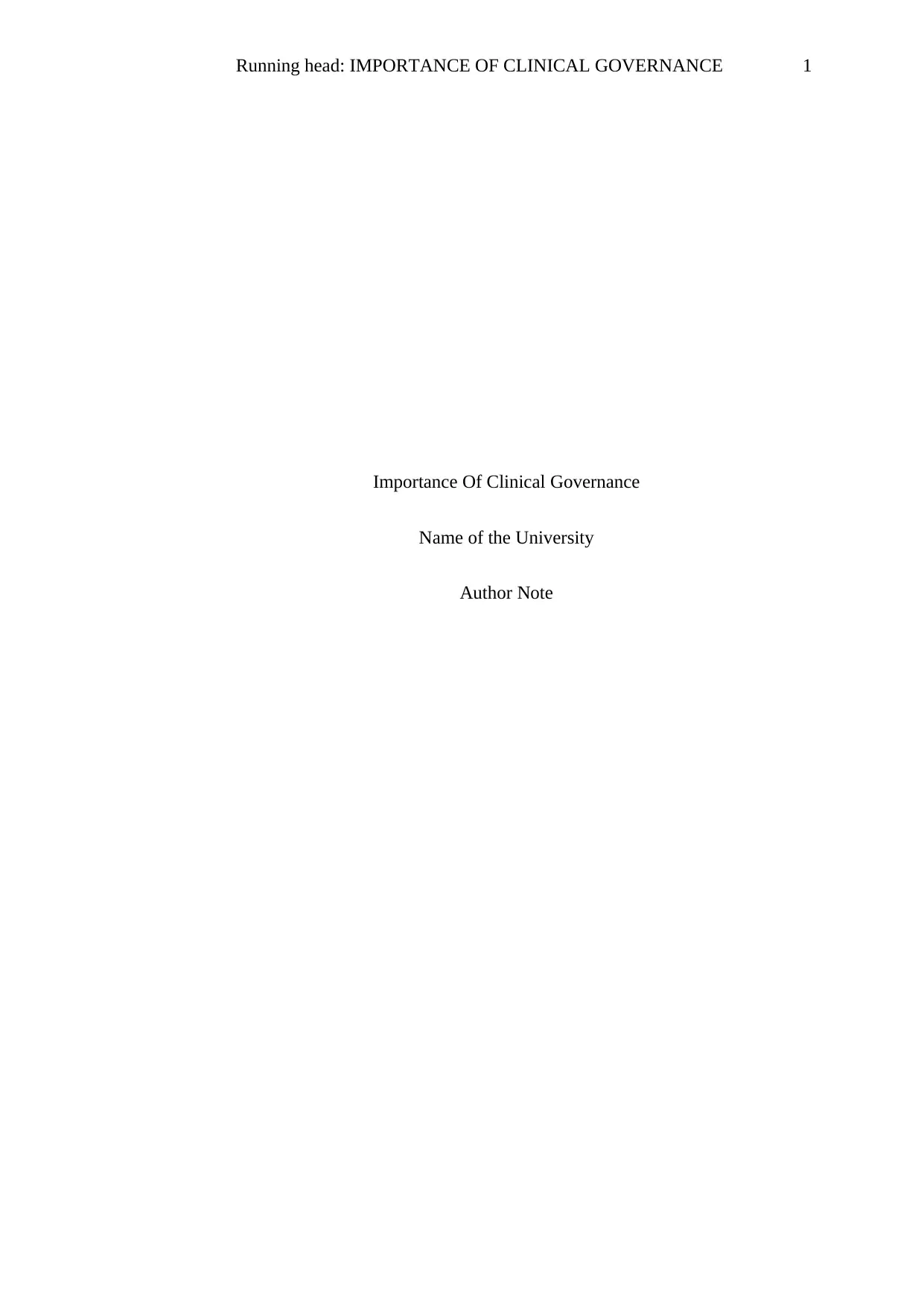
Running head: IMPORTANCE OF CLINICAL GOVERNANCE 1
Importance Of Clinical Governance
Name of the University
Author Note
Importance Of Clinical Governance
Name of the University
Author Note
Secure Best Marks with AI Grader
Need help grading? Try our AI Grader for instant feedback on your assignments.
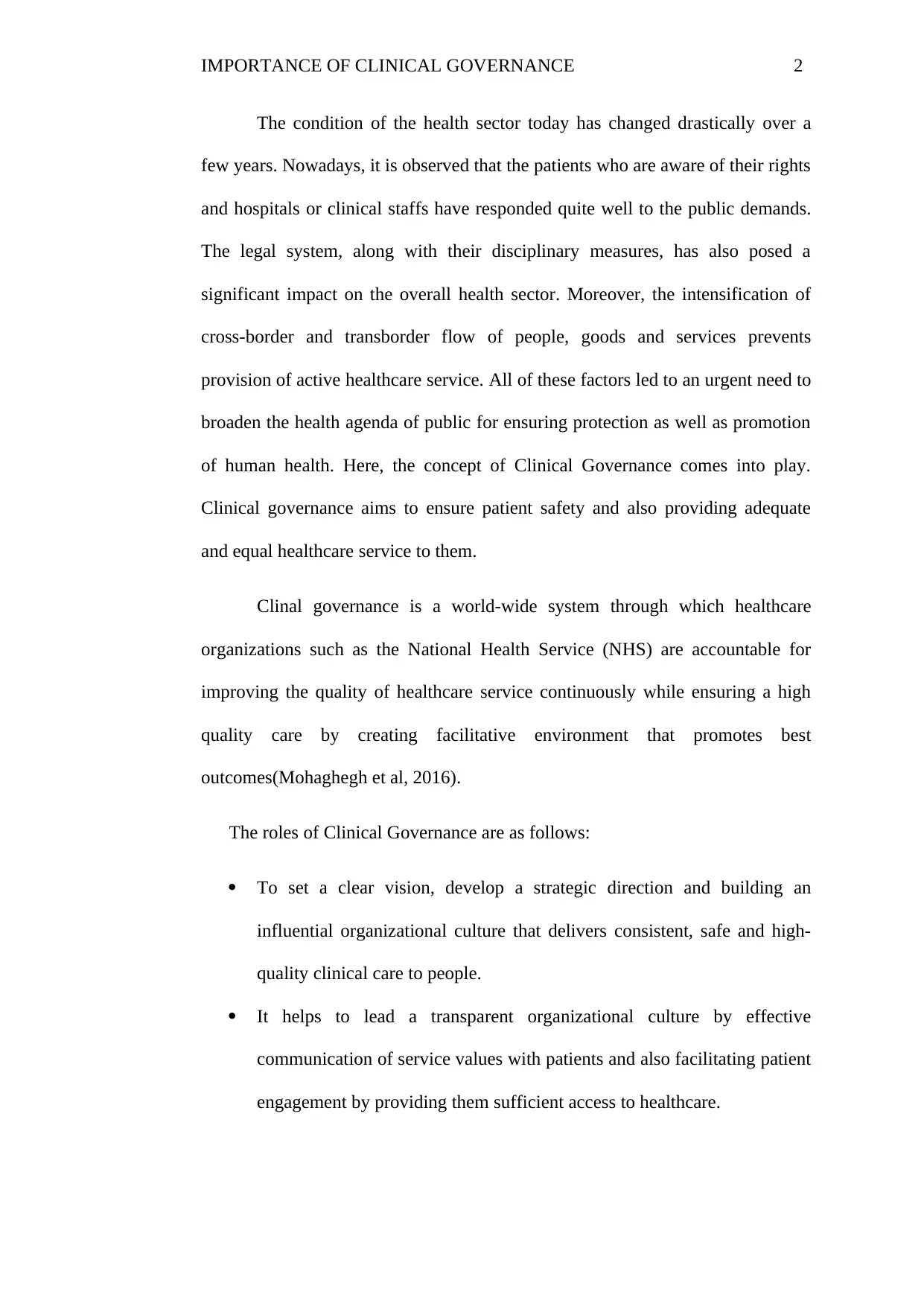
IMPORTANCE OF CLINICAL GOVERNANCE 2
The condition of the health sector today has changed drastically over a
few years. Nowadays, it is observed that the patients who are aware of their rights
and hospitals or clinical staffs have responded quite well to the public demands.
The legal system, along with their disciplinary measures, has also posed a
significant impact on the overall health sector. Moreover, the intensification of
cross-border and transborder flow of people, goods and services prevents
provision of active healthcare service. All of these factors led to an urgent need to
broaden the health agenda of public for ensuring protection as well as promotion
of human health. Here, the concept of Clinical Governance comes into play.
Clinical governance aims to ensure patient safety and also providing adequate
and equal healthcare service to them.
Clinal governance is a world-wide system through which healthcare
organizations such as the National Health Service (NHS) are accountable for
improving the quality of healthcare service continuously while ensuring a high
quality care by creating facilitative environment that promotes best
outcomes(Mohaghegh et al, 2016).
The roles of Clinical Governance are as follows:
To set a clear vision, develop a strategic direction and building an
influential organizational culture that delivers consistent, safe and high-
quality clinical care to people.
It helps to lead a transparent organizational culture by effective
communication of service values with patients and also facilitating patient
engagement by providing them sufficient access to healthcare.
The condition of the health sector today has changed drastically over a
few years. Nowadays, it is observed that the patients who are aware of their rights
and hospitals or clinical staffs have responded quite well to the public demands.
The legal system, along with their disciplinary measures, has also posed a
significant impact on the overall health sector. Moreover, the intensification of
cross-border and transborder flow of people, goods and services prevents
provision of active healthcare service. All of these factors led to an urgent need to
broaden the health agenda of public for ensuring protection as well as promotion
of human health. Here, the concept of Clinical Governance comes into play.
Clinical governance aims to ensure patient safety and also providing adequate
and equal healthcare service to them.
Clinal governance is a world-wide system through which healthcare
organizations such as the National Health Service (NHS) are accountable for
improving the quality of healthcare service continuously while ensuring a high
quality care by creating facilitative environment that promotes best
outcomes(Mohaghegh et al, 2016).
The roles of Clinical Governance are as follows:
To set a clear vision, develop a strategic direction and building an
influential organizational culture that delivers consistent, safe and high-
quality clinical care to people.
It helps to lead a transparent organizational culture by effective
communication of service values with patients and also facilitating patient
engagement by providing them sufficient access to healthcare.
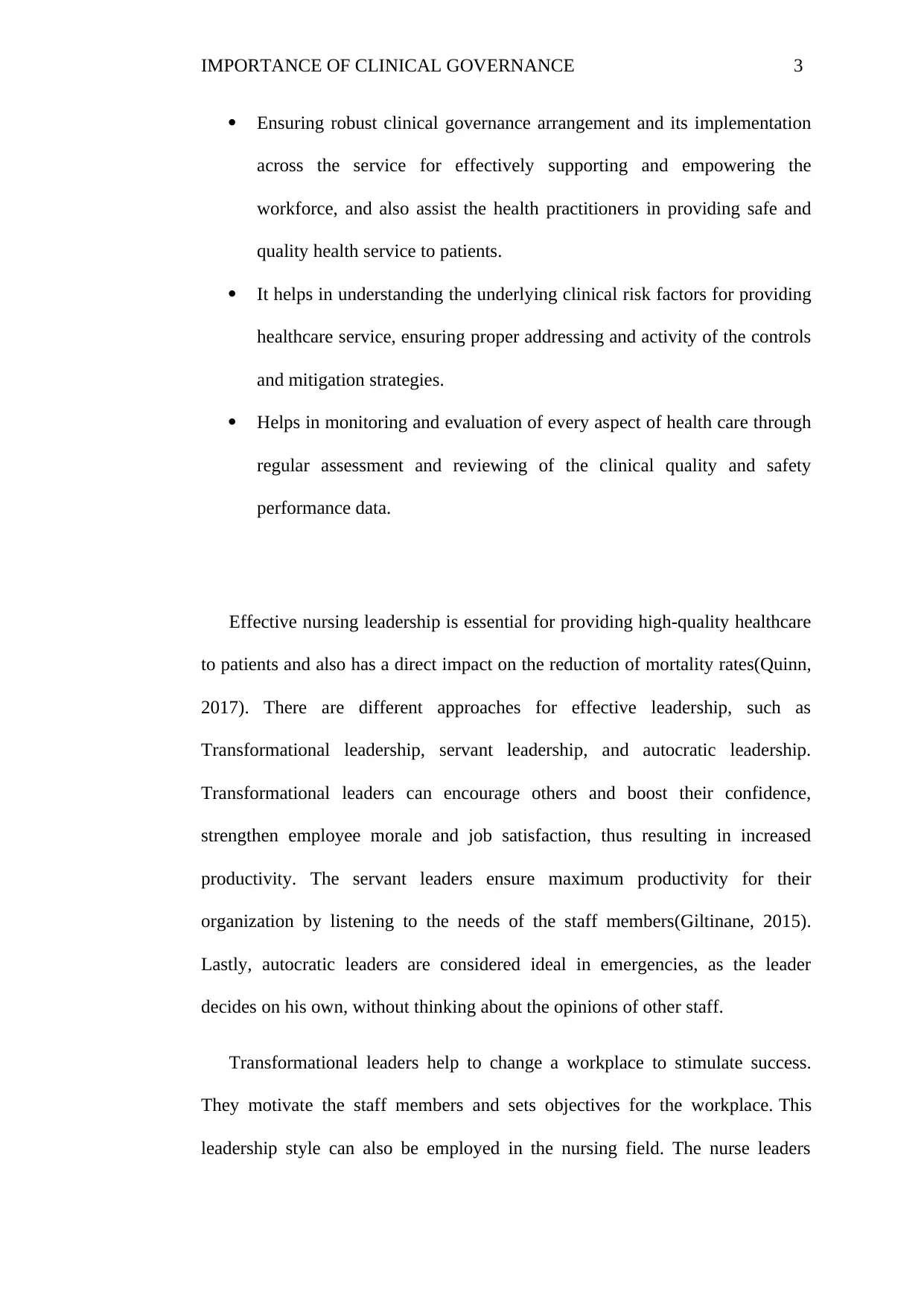
IMPORTANCE OF CLINICAL GOVERNANCE 3
Ensuring robust clinical governance arrangement and its implementation
across the service for effectively supporting and empowering the
workforce, and also assist the health practitioners in providing safe and
quality health service to patients.
It helps in understanding the underlying clinical risk factors for providing
healthcare service, ensuring proper addressing and activity of the controls
and mitigation strategies.
Helps in monitoring and evaluation of every aspect of health care through
regular assessment and reviewing of the clinical quality and safety
performance data.
Effective nursing leadership is essential for providing high-quality healthcare
to patients and also has a direct impact on the reduction of mortality rates(Quinn,
2017). There are different approaches for effective leadership, such as
Transformational leadership, servant leadership, and autocratic leadership.
Transformational leaders can encourage others and boost their confidence,
strengthen employee morale and job satisfaction, thus resulting in increased
productivity. The servant leaders ensure maximum productivity for their
organization by listening to the needs of the staff members(Giltinane, 2015).
Lastly, autocratic leaders are considered ideal in emergencies, as the leader
decides on his own, without thinking about the opinions of other staff.
Transformational leaders help to change a workplace to stimulate success.
They motivate the staff members and sets objectives for the workplace. This
leadership style can also be employed in the nursing field. The nurse leaders
Ensuring robust clinical governance arrangement and its implementation
across the service for effectively supporting and empowering the
workforce, and also assist the health practitioners in providing safe and
quality health service to patients.
It helps in understanding the underlying clinical risk factors for providing
healthcare service, ensuring proper addressing and activity of the controls
and mitigation strategies.
Helps in monitoring and evaluation of every aspect of health care through
regular assessment and reviewing of the clinical quality and safety
performance data.
Effective nursing leadership is essential for providing high-quality healthcare
to patients and also has a direct impact on the reduction of mortality rates(Quinn,
2017). There are different approaches for effective leadership, such as
Transformational leadership, servant leadership, and autocratic leadership.
Transformational leaders can encourage others and boost their confidence,
strengthen employee morale and job satisfaction, thus resulting in increased
productivity. The servant leaders ensure maximum productivity for their
organization by listening to the needs of the staff members(Giltinane, 2015).
Lastly, autocratic leaders are considered ideal in emergencies, as the leader
decides on his own, without thinking about the opinions of other staff.
Transformational leaders help to change a workplace to stimulate success.
They motivate the staff members and sets objectives for the workplace. This
leadership style can also be employed in the nursing field. The nurse leaders
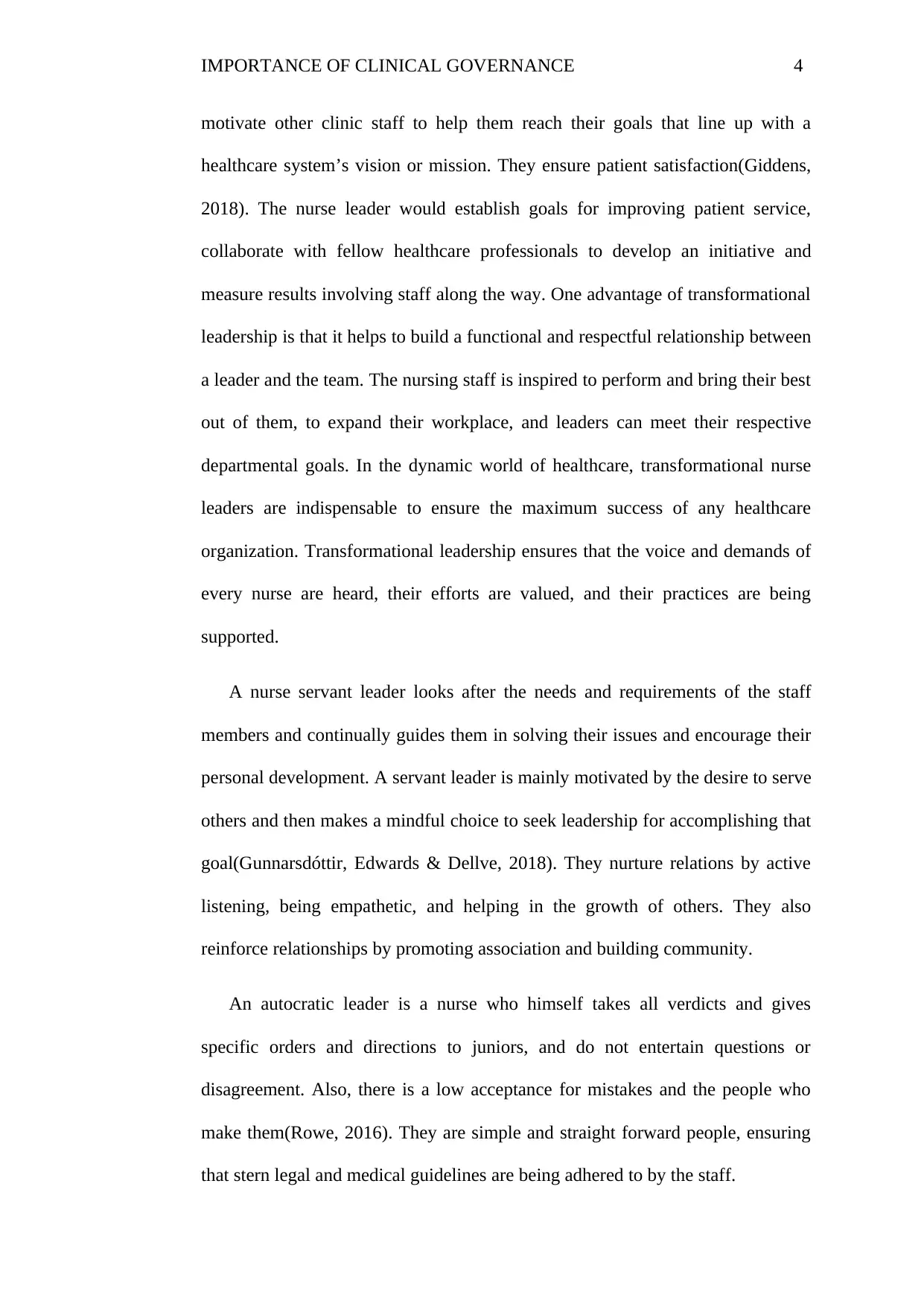
IMPORTANCE OF CLINICAL GOVERNANCE 4
motivate other clinic staff to help them reach their goals that line up with a
healthcare system’s vision or mission. They ensure patient satisfaction(Giddens,
2018). The nurse leader would establish goals for improving patient service,
collaborate with fellow healthcare professionals to develop an initiative and
measure results involving staff along the way. One advantage of transformational
leadership is that it helps to build a functional and respectful relationship between
a leader and the team. The nursing staff is inspired to perform and bring their best
out of them, to expand their workplace, and leaders can meet their respective
departmental goals. In the dynamic world of healthcare, transformational nurse
leaders are indispensable to ensure the maximum success of any healthcare
organization. Transformational leadership ensures that the voice and demands of
every nurse are heard, their efforts are valued, and their practices are being
supported.
A nurse servant leader looks after the needs and requirements of the staff
members and continually guides them in solving their issues and encourage their
personal development. A servant leader is mainly motivated by the desire to serve
others and then makes a mindful choice to seek leadership for accomplishing that
goal(Gunnarsdóttir, Edwards & Dellve, 2018). They nurture relations by active
listening, being empathetic, and helping in the growth of others. They also
reinforce relationships by promoting association and building community.
An autocratic leader is a nurse who himself takes all verdicts and gives
specific orders and directions to juniors, and do not entertain questions or
disagreement. Also, there is a low acceptance for mistakes and the people who
make them(Rowe, 2016). They are simple and straight forward people, ensuring
that stern legal and medical guidelines are being adhered to by the staff.
motivate other clinic staff to help them reach their goals that line up with a
healthcare system’s vision or mission. They ensure patient satisfaction(Giddens,
2018). The nurse leader would establish goals for improving patient service,
collaborate with fellow healthcare professionals to develop an initiative and
measure results involving staff along the way. One advantage of transformational
leadership is that it helps to build a functional and respectful relationship between
a leader and the team. The nursing staff is inspired to perform and bring their best
out of them, to expand their workplace, and leaders can meet their respective
departmental goals. In the dynamic world of healthcare, transformational nurse
leaders are indispensable to ensure the maximum success of any healthcare
organization. Transformational leadership ensures that the voice and demands of
every nurse are heard, their efforts are valued, and their practices are being
supported.
A nurse servant leader looks after the needs and requirements of the staff
members and continually guides them in solving their issues and encourage their
personal development. A servant leader is mainly motivated by the desire to serve
others and then makes a mindful choice to seek leadership for accomplishing that
goal(Gunnarsdóttir, Edwards & Dellve, 2018). They nurture relations by active
listening, being empathetic, and helping in the growth of others. They also
reinforce relationships by promoting association and building community.
An autocratic leader is a nurse who himself takes all verdicts and gives
specific orders and directions to juniors, and do not entertain questions or
disagreement. Also, there is a low acceptance for mistakes and the people who
make them(Rowe, 2016). They are simple and straight forward people, ensuring
that stern legal and medical guidelines are being adhered to by the staff.
Secure Best Marks with AI Grader
Need help grading? Try our AI Grader for instant feedback on your assignments.
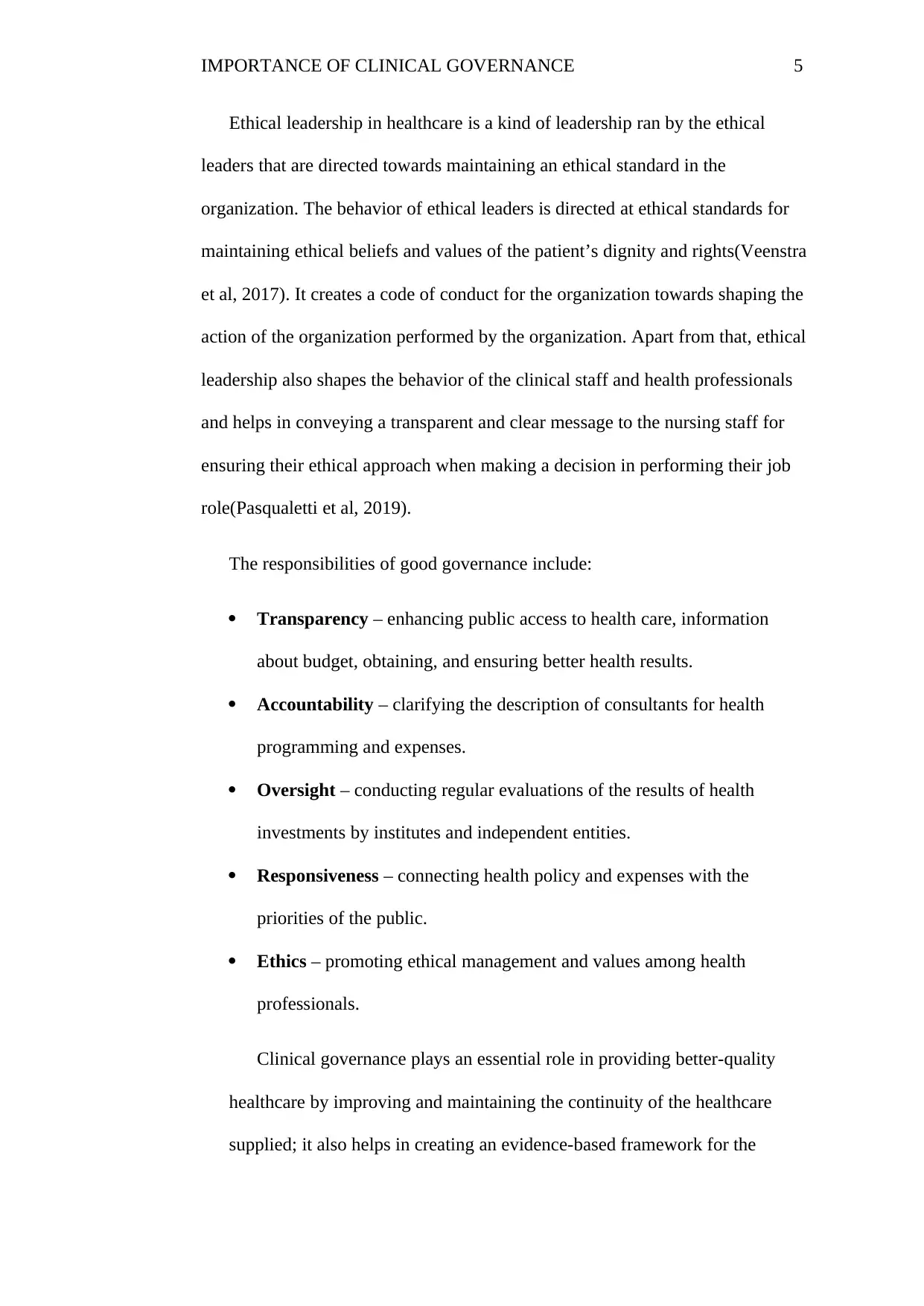
IMPORTANCE OF CLINICAL GOVERNANCE 5
Ethical leadership in healthcare is a kind of leadership ran by the ethical
leaders that are directed towards maintaining an ethical standard in the
organization. The behavior of ethical leaders is directed at ethical standards for
maintaining ethical beliefs and values of the patient’s dignity and rights(Veenstra
et al, 2017). It creates a code of conduct for the organization towards shaping the
action of the organization performed by the organization. Apart from that, ethical
leadership also shapes the behavior of the clinical staff and health professionals
and helps in conveying a transparent and clear message to the nursing staff for
ensuring their ethical approach when making a decision in performing their job
role(Pasqualetti et al, 2019).
The responsibilities of good governance include:
Transparency – enhancing public access to health care, information
about budget, obtaining, and ensuring better health results.
Accountability – clarifying the description of consultants for health
programming and expenses.
Oversight – conducting regular evaluations of the results of health
investments by institutes and independent entities.
Responsiveness – connecting health policy and expenses with the
priorities of the public.
Ethics – promoting ethical management and values among health
professionals.
Clinical governance plays an essential role in providing better-quality
healthcare by improving and maintaining the continuity of the healthcare
supplied; it also helps in creating an evidence-based framework for the
Ethical leadership in healthcare is a kind of leadership ran by the ethical
leaders that are directed towards maintaining an ethical standard in the
organization. The behavior of ethical leaders is directed at ethical standards for
maintaining ethical beliefs and values of the patient’s dignity and rights(Veenstra
et al, 2017). It creates a code of conduct for the organization towards shaping the
action of the organization performed by the organization. Apart from that, ethical
leadership also shapes the behavior of the clinical staff and health professionals
and helps in conveying a transparent and clear message to the nursing staff for
ensuring their ethical approach when making a decision in performing their job
role(Pasqualetti et al, 2019).
The responsibilities of good governance include:
Transparency – enhancing public access to health care, information
about budget, obtaining, and ensuring better health results.
Accountability – clarifying the description of consultants for health
programming and expenses.
Oversight – conducting regular evaluations of the results of health
investments by institutes and independent entities.
Responsiveness – connecting health policy and expenses with the
priorities of the public.
Ethics – promoting ethical management and values among health
professionals.
Clinical governance plays an essential role in providing better-quality
healthcare by improving and maintaining the continuity of the healthcare
supplied; it also helps in creating an evidence-based framework for the
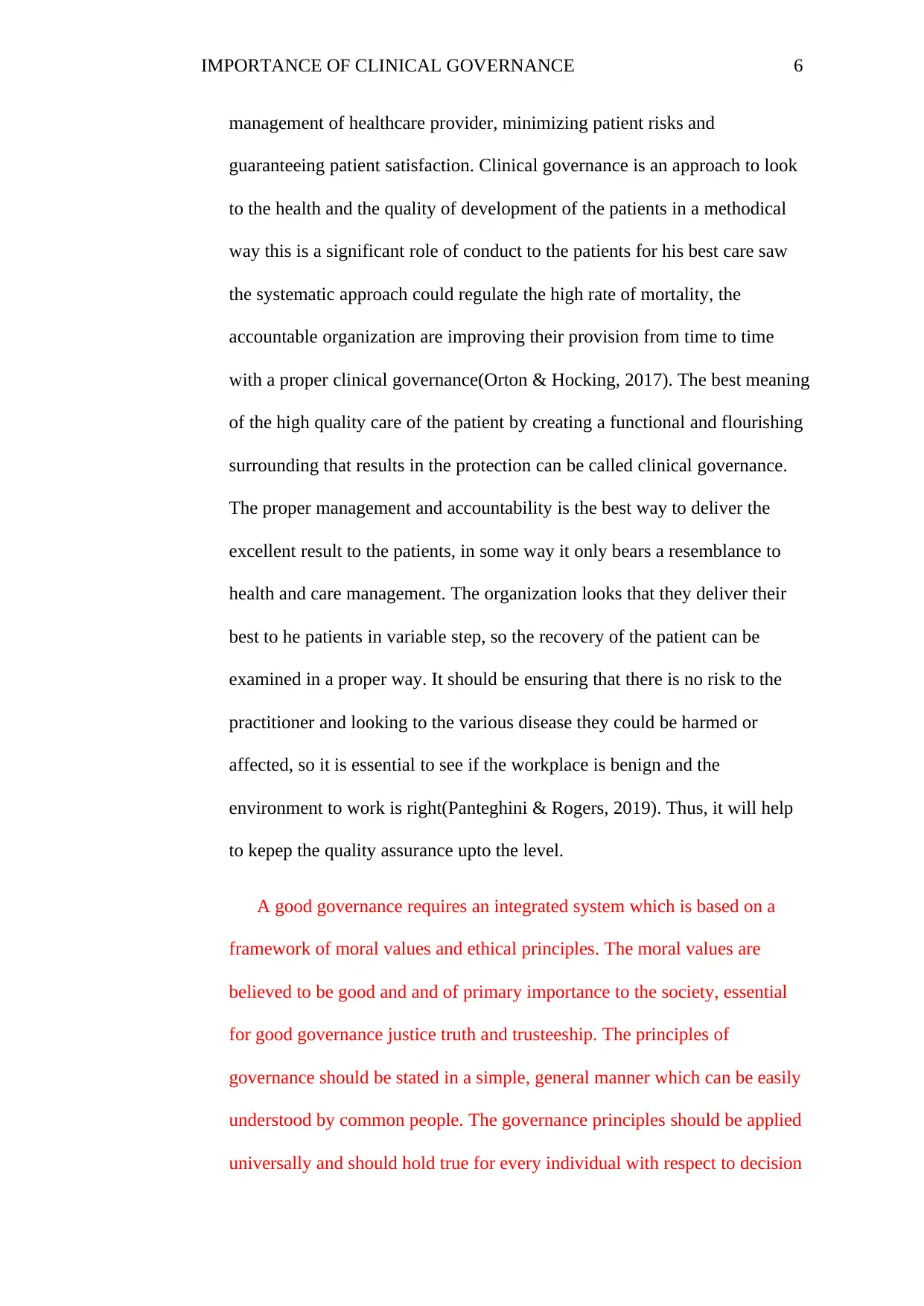
IMPORTANCE OF CLINICAL GOVERNANCE 6
management of healthcare provider, minimizing patient risks and
guaranteeing patient satisfaction. Clinical governance is an approach to look
to the health and the quality of development of the patients in a methodical
way this is a significant role of conduct to the patients for his best care saw
the systematic approach could regulate the high rate of mortality, the
accountable organization are improving their provision from time to time
with a proper clinical governance(Orton & Hocking, 2017). The best meaning
of the high quality care of the patient by creating a functional and flourishing
surrounding that results in the protection can be called clinical governance.
The proper management and accountability is the best way to deliver the
excellent result to the patients, in some way it only bears a resemblance to
health and care management. The organization looks that they deliver their
best to he patients in variable step, so the recovery of the patient can be
examined in a proper way. It should be ensuring that there is no risk to the
practitioner and looking to the various disease they could be harmed or
affected, so it is essential to see if the workplace is benign and the
environment to work is right(Panteghini & Rogers, 2019). Thus, it will help
to kepep the quality assurance upto the level.
A good governance requires an integrated system which is based on a
framework of moral values and ethical principles. The moral values are
believed to be good and and of primary importance to the society, essential
for good governance justice truth and trusteeship. The principles of
governance should be stated in a simple, general manner which can be easily
understood by common people. The governance principles should be applied
universally and should hold true for every individual with respect to decision
management of healthcare provider, minimizing patient risks and
guaranteeing patient satisfaction. Clinical governance is an approach to look
to the health and the quality of development of the patients in a methodical
way this is a significant role of conduct to the patients for his best care saw
the systematic approach could regulate the high rate of mortality, the
accountable organization are improving their provision from time to time
with a proper clinical governance(Orton & Hocking, 2017). The best meaning
of the high quality care of the patient by creating a functional and flourishing
surrounding that results in the protection can be called clinical governance.
The proper management and accountability is the best way to deliver the
excellent result to the patients, in some way it only bears a resemblance to
health and care management. The organization looks that they deliver their
best to he patients in variable step, so the recovery of the patient can be
examined in a proper way. It should be ensuring that there is no risk to the
practitioner and looking to the various disease they could be harmed or
affected, so it is essential to see if the workplace is benign and the
environment to work is right(Panteghini & Rogers, 2019). Thus, it will help
to kepep the quality assurance upto the level.
A good governance requires an integrated system which is based on a
framework of moral values and ethical principles. The moral values are
believed to be good and and of primary importance to the society, essential
for good governance justice truth and trusteeship. The principles of
governance should be stated in a simple, general manner which can be easily
understood by common people. The governance principles should be applied
universally and should hold true for every individual with respect to decision
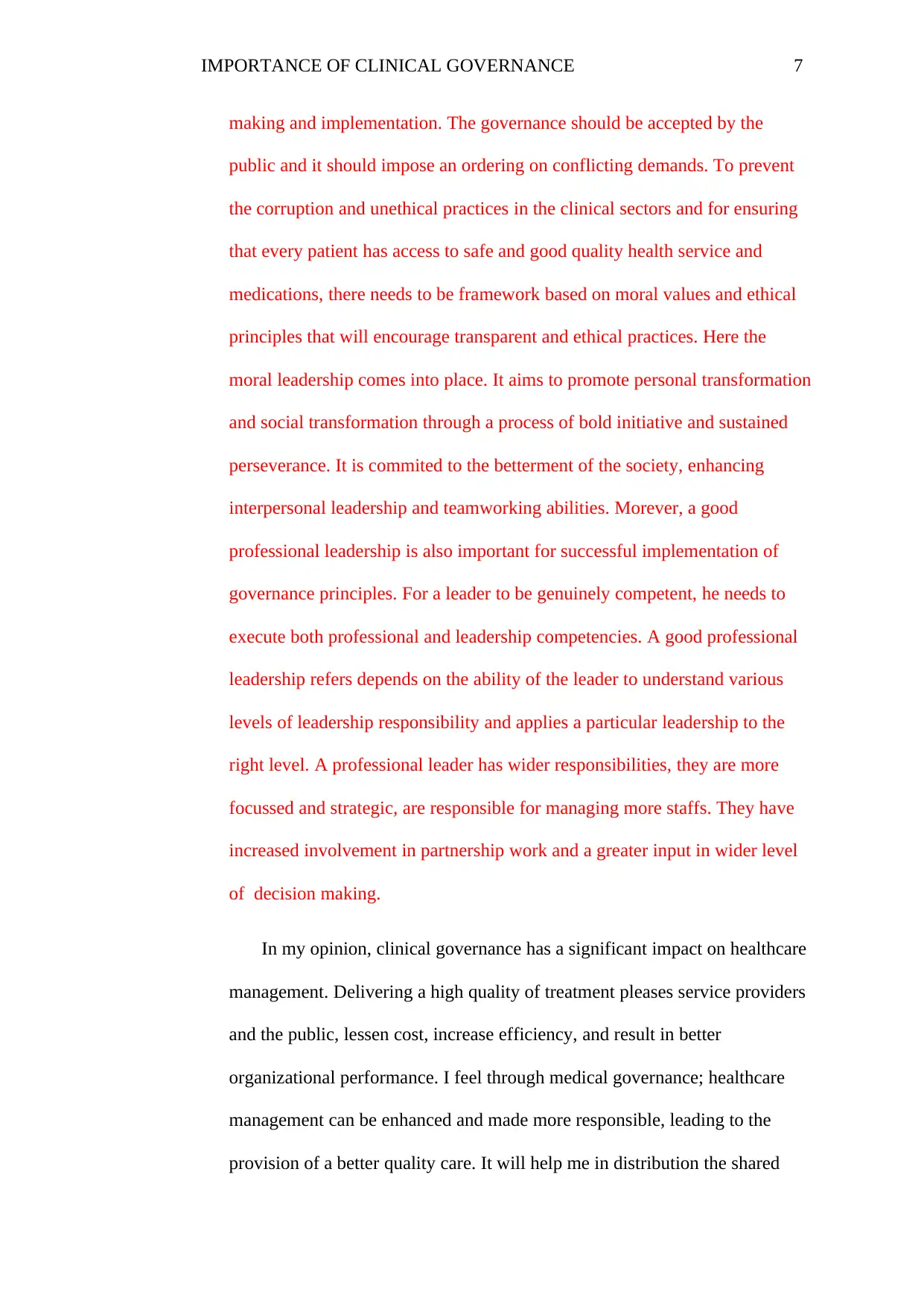
IMPORTANCE OF CLINICAL GOVERNANCE 7
making and implementation. The governance should be accepted by the
public and it should impose an ordering on conflicting demands. To prevent
the corruption and unethical practices in the clinical sectors and for ensuring
that every patient has access to safe and good quality health service and
medications, there needs to be framework based on moral values and ethical
principles that will encourage transparent and ethical practices. Here the
moral leadership comes into place. It aims to promote personal transformation
and social transformation through a process of bold initiative and sustained
perseverance. It is commited to the betterment of the society, enhancing
interpersonal leadership and teamworking abilities. Morever, a good
professional leadership is also important for successful implementation of
governance principles. For a leader to be genuinely competent, he needs to
execute both professional and leadership competencies. A good professional
leadership refers depends on the ability of the leader to understand various
levels of leadership responsibility and applies a particular leadership to the
right level. A professional leader has wider responsibilities, they are more
focussed and strategic, are responsible for managing more staffs. They have
increased involvement in partnership work and a greater input in wider level
of decision making.
In my opinion, clinical governance has a significant impact on healthcare
management. Delivering a high quality of treatment pleases service providers
and the public, lessen cost, increase efficiency, and result in better
organizational performance. I feel through medical governance; healthcare
management can be enhanced and made more responsible, leading to the
provision of a better quality care. It will help me in distribution the shared
making and implementation. The governance should be accepted by the
public and it should impose an ordering on conflicting demands. To prevent
the corruption and unethical practices in the clinical sectors and for ensuring
that every patient has access to safe and good quality health service and
medications, there needs to be framework based on moral values and ethical
principles that will encourage transparent and ethical practices. Here the
moral leadership comes into place. It aims to promote personal transformation
and social transformation through a process of bold initiative and sustained
perseverance. It is commited to the betterment of the society, enhancing
interpersonal leadership and teamworking abilities. Morever, a good
professional leadership is also important for successful implementation of
governance principles. For a leader to be genuinely competent, he needs to
execute both professional and leadership competencies. A good professional
leadership refers depends on the ability of the leader to understand various
levels of leadership responsibility and applies a particular leadership to the
right level. A professional leader has wider responsibilities, they are more
focussed and strategic, are responsible for managing more staffs. They have
increased involvement in partnership work and a greater input in wider level
of decision making.
In my opinion, clinical governance has a significant impact on healthcare
management. Delivering a high quality of treatment pleases service providers
and the public, lessen cost, increase efficiency, and result in better
organizational performance. I feel through medical governance; healthcare
management can be enhanced and made more responsible, leading to the
provision of a better quality care. It will help me in distribution the shared
Paraphrase This Document
Need a fresh take? Get an instant paraphrase of this document with our AI Paraphraser
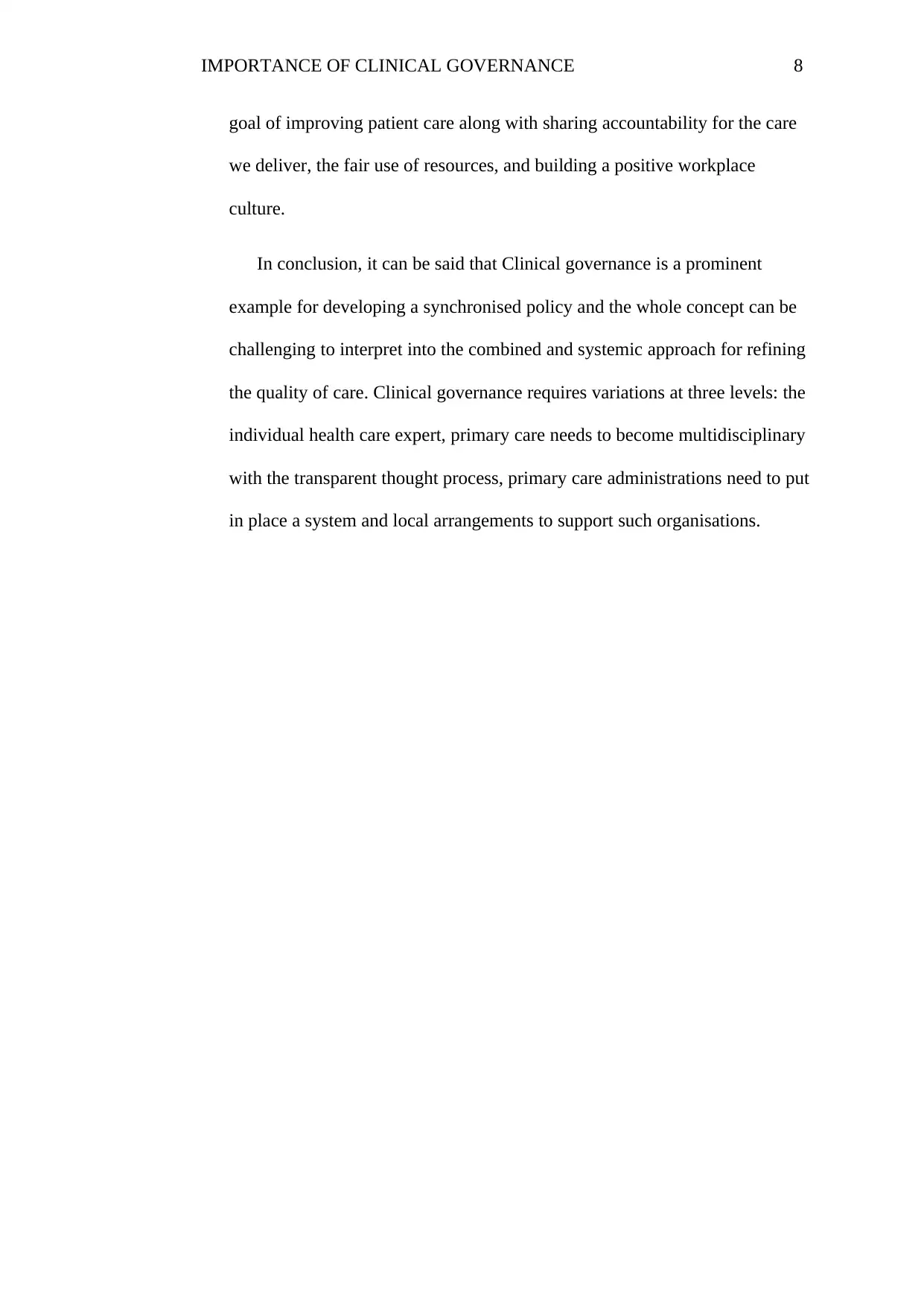
IMPORTANCE OF CLINICAL GOVERNANCE 8
goal of improving patient care along with sharing accountability for the care
we deliver, the fair use of resources, and building a positive workplace
culture.
In conclusion, it can be said that Clinical governance is a prominent
example for developing a synchronised policy and the whole concept can be
challenging to interpret into the combined and systemic approach for refining
the quality of care. Clinical governance requires variations at three levels: the
individual health care expert, primary care needs to become multidisciplinary
with the transparent thought process, primary care administrations need to put
in place a system and local arrangements to support such organisations.
goal of improving patient care along with sharing accountability for the care
we deliver, the fair use of resources, and building a positive workplace
culture.
In conclusion, it can be said that Clinical governance is a prominent
example for developing a synchronised policy and the whole concept can be
challenging to interpret into the combined and systemic approach for refining
the quality of care. Clinical governance requires variations at three levels: the
individual health care expert, primary care needs to become multidisciplinary
with the transparent thought process, primary care administrations need to put
in place a system and local arrangements to support such organisations.
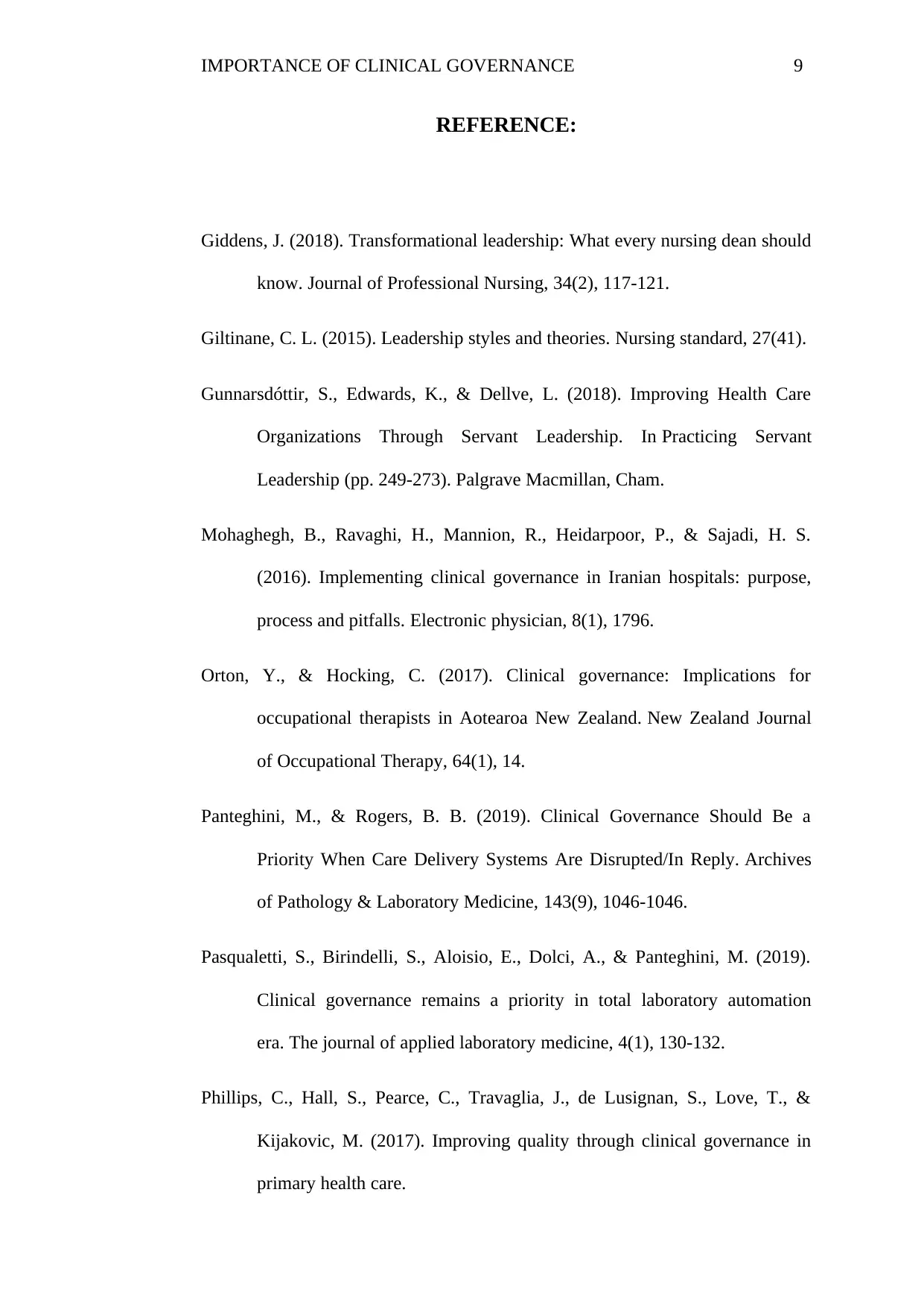
IMPORTANCE OF CLINICAL GOVERNANCE 9
REFERENCE:
Giddens, J. (2018). Transformational leadership: What every nursing dean should
know. Journal of Professional Nursing, 34(2), 117-121.
Giltinane, C. L. (2015). Leadership styles and theories. Nursing standard, 27(41).
Gunnarsdóttir, S., Edwards, K., & Dellve, L. (2018). Improving Health Care
Organizations Through Servant Leadership. In Practicing Servant
Leadership (pp. 249-273). Palgrave Macmillan, Cham.
Mohaghegh, B., Ravaghi, H., Mannion, R., Heidarpoor, P., & Sajadi, H. S.
(2016). Implementing clinical governance in Iranian hospitals: purpose,
process and pitfalls. Electronic physician, 8(1), 1796.
Orton, Y., & Hocking, C. (2017). Clinical governance: Implications for
occupational therapists in Aotearoa New Zealand. New Zealand Journal
of Occupational Therapy, 64(1), 14.
Panteghini, M., & Rogers, B. B. (2019). Clinical Governance Should Be a
Priority When Care Delivery Systems Are Disrupted/In Reply. Archives
of Pathology & Laboratory Medicine, 143(9), 1046-1046.
Pasqualetti, S., Birindelli, S., Aloisio, E., Dolci, A., & Panteghini, M. (2019).
Clinical governance remains a priority in total laboratory automation
era. The journal of applied laboratory medicine, 4(1), 130-132.
Phillips, C., Hall, S., Pearce, C., Travaglia, J., de Lusignan, S., Love, T., &
Kijakovic, M. (2017). Improving quality through clinical governance in
primary health care.
REFERENCE:
Giddens, J. (2018). Transformational leadership: What every nursing dean should
know. Journal of Professional Nursing, 34(2), 117-121.
Giltinane, C. L. (2015). Leadership styles and theories. Nursing standard, 27(41).
Gunnarsdóttir, S., Edwards, K., & Dellve, L. (2018). Improving Health Care
Organizations Through Servant Leadership. In Practicing Servant
Leadership (pp. 249-273). Palgrave Macmillan, Cham.
Mohaghegh, B., Ravaghi, H., Mannion, R., Heidarpoor, P., & Sajadi, H. S.
(2016). Implementing clinical governance in Iranian hospitals: purpose,
process and pitfalls. Electronic physician, 8(1), 1796.
Orton, Y., & Hocking, C. (2017). Clinical governance: Implications for
occupational therapists in Aotearoa New Zealand. New Zealand Journal
of Occupational Therapy, 64(1), 14.
Panteghini, M., & Rogers, B. B. (2019). Clinical Governance Should Be a
Priority When Care Delivery Systems Are Disrupted/In Reply. Archives
of Pathology & Laboratory Medicine, 143(9), 1046-1046.
Pasqualetti, S., Birindelli, S., Aloisio, E., Dolci, A., & Panteghini, M. (2019).
Clinical governance remains a priority in total laboratory automation
era. The journal of applied laboratory medicine, 4(1), 130-132.
Phillips, C., Hall, S., Pearce, C., Travaglia, J., de Lusignan, S., Love, T., &
Kijakovic, M. (2017). Improving quality through clinical governance in
primary health care.
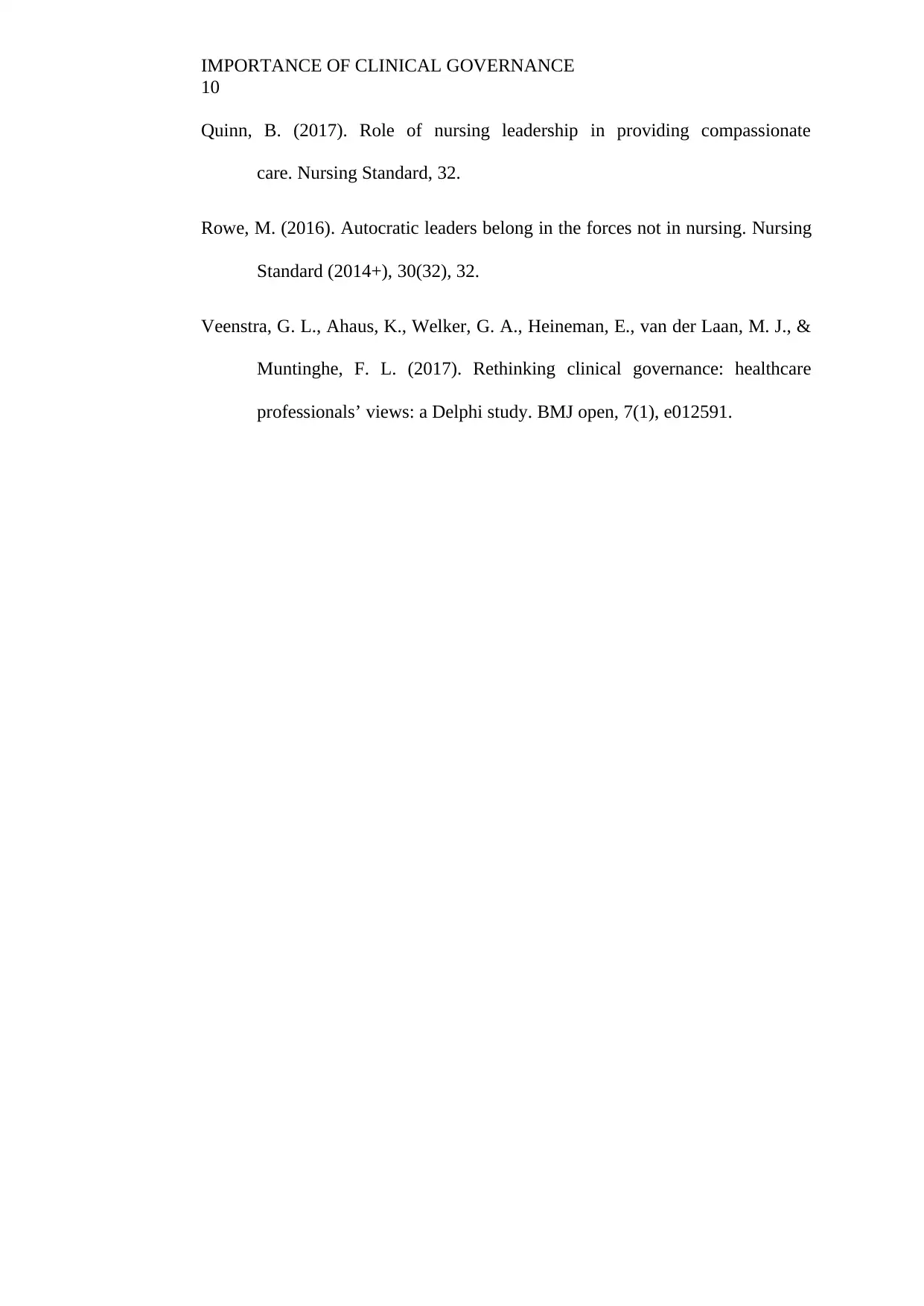
IMPORTANCE OF CLINICAL GOVERNANCE
10
Quinn, B. (2017). Role of nursing leadership in providing compassionate
care. Nursing Standard, 32.
Rowe, M. (2016). Autocratic leaders belong in the forces not in nursing. Nursing
Standard (2014+), 30(32), 32.
Veenstra, G. L., Ahaus, K., Welker, G. A., Heineman, E., van der Laan, M. J., &
Muntinghe, F. L. (2017). Rethinking clinical governance: healthcare
professionals’ views: a Delphi study. BMJ open, 7(1), e012591.
10
Quinn, B. (2017). Role of nursing leadership in providing compassionate
care. Nursing Standard, 32.
Rowe, M. (2016). Autocratic leaders belong in the forces not in nursing. Nursing
Standard (2014+), 30(32), 32.
Veenstra, G. L., Ahaus, K., Welker, G. A., Heineman, E., van der Laan, M. J., &
Muntinghe, F. L. (2017). Rethinking clinical governance: healthcare
professionals’ views: a Delphi study. BMJ open, 7(1), e012591.
1 out of 10
Related Documents
Your All-in-One AI-Powered Toolkit for Academic Success.
+13062052269
info@desklib.com
Available 24*7 on WhatsApp / Email
![[object Object]](/_next/static/media/star-bottom.7253800d.svg)
Unlock your academic potential
© 2024 | Zucol Services PVT LTD | All rights reserved.





